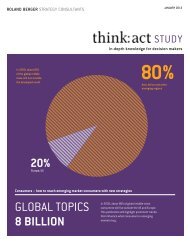issue 1 - Roland Berger
issue 1 - Roland Berger
issue 1 - Roland Berger
You also want an ePaper? Increase the reach of your titles
YUMPU automatically turns print PDFs into web optimized ePapers that Google loves.
a global average of 30 billion sms messages are sent every month<br />
business culture f<br />
DeTeMobil, which evolved into T-Mobile,<br />
failed to take its own development seriously.<br />
During the test phase the service was offered<br />
free of charge for almost a year. That is hard<br />
to believe when one considers that today<br />
mobile communications providers make billions<br />
from SMS—with the trend rising.<br />
In only 10 years, cell phones and SMS have<br />
dramatically changed business communications.<br />
Among business associates and partners,<br />
giving someone your cell phone<br />
number is a sign of trust, of “I’ll be there<br />
when you need me.” The cell phone—and<br />
with it SMS messaging—have become essential<br />
management tools. Whether important<br />
documents relating to a contract need to be<br />
forwarded, a phone conference coordinated<br />
or a small gift sent to a customer, today all it<br />
takes is a short message and everything is<br />
taken care of.<br />
Cell phones are also becoming more and<br />
more important for intra-company communications.<br />
Now service and sales employees are<br />
almost exclusively connected to their head<br />
office via mobile phones. Teams can be managed<br />
via SMS and can be fed all the available<br />
information on a client. SMS enables users to<br />
solve technical problems, request sales aids<br />
or order replacement parts on-site, significantly<br />
reducing response times and increasing<br />
customer satisfaction. They present<br />
potential for optimization that far too few<br />
companies are currently taking advantage of.<br />
An innovation developed by <strong>Roland</strong> <strong>Berger</strong><br />
Strategy Consultants demonstrates what a<br />
modern employee communications tool can<br />
look like. The consulting company updates<br />
its consultants via a mobile news channel<br />
every two weeks on company-related information.<br />
Employees get a subject overview<br />
via SMS together with a telephone number<br />
they can use to retrieve the news. All they<br />
have to do is make the call, get authorization<br />
and listen to the report.<br />
Just as fundamental as the changes in the<br />
business world are those taking place in the<br />
private sphere. People who cannot be<br />
reached or have turned off their cell phone<br />
are cut off from their friends and associates.<br />
Communication has also changed. Stressful,<br />
awkward phone conversations are often<br />
bypassed with an SMS, the dialog reduced to<br />
brief, telegram-like phrases. BBC Online<br />
recently asked whether SMS shorthand has<br />
become mightier than the written word.<br />
People responded from around the world<br />
with literary quotations, such as “w8ing 4 go.”<br />
(“Waiting for Godot”) and “2b/-2b” (“to be or<br />
not to be”), shortened hymns, such as “Gd $ th<br />
Qun” (“God save the Queen”), and lines of<br />
prayer, such as “dad@hvn” (“Our Father who<br />
art in heaven”). Teenagers have a particular<br />
fondness for communicating cryptically via<br />
SMS. While philologists have been speculating<br />
on the likely consequences of this, the<br />
advertising industry has long recognized it as<br />
an opportunity. With 14 to 30 year-olds so difficult<br />
to reach via traditional print and<br />
advertising media, the cell phone has proven<br />
a powerful marketing tool and sales channel.<br />
SMS—three letters that changed the world. The<br />
massive hit with teens is also a valuable business<br />
communications tool. Machines, too, are starting<br />
to communicate via SMS, a phenomenon heralded by<br />
the soda machines at the 2000 Expo, which could<br />
send updates on their contents and refill status.<br />
Coca-Cola in Belgium, for example, increased<br />
sales of its 200 milliliter bottles in cafés by<br />
8 percent during a 2003 SMS campaign. Even<br />
Gossard, the women’s underwear manufacturer,<br />
received 75,000 euros worth of orders<br />
via SMS when it introduced a new range in<br />
Great Britain—those interested had merely<br />
to send in the code word “G4me.”<br />
Thanks to the international acceptance of<br />
GSM technology and numerous roaming<br />
agreements, users can send SMS messages<br />
and make mobile calls in more than 40 countries<br />
spread over all continents. Market penetration<br />
figures offer confirmation of the huge<br />
growth potential still to be tapped. Penetration<br />
has visibly increased since 1997, but is<br />
still only 24 percent worldwide. Western<br />
Europe is at the top, with 83 percent and<br />
400 million registered cell phone numbers,<br />
ahead of North America with 60 percent and<br />
200 million connections. In terms of sheer<br />
quantity, the Asia-Pacific region has the<br />
greatest number of cell phones. Put another<br />
way, 500 million customers there represent a<br />
market penetration of only 30 percent.<br />
Experts estimate that in 2004, 1.4 billion cell<br />
phones will send more than 360 billion SMS<br />
messages. Interestingly, Sweden already has<br />
more cell phones than inhabitants, with 8.8<br />
million people owning 9.1 million phones.<br />
With technology having paved the way for<br />
even niftier features, no end to the boom is in<br />
sight. Users can now send photos between<br />
cell phones via the Multimedia Messaging<br />
Service (MMS). And the arrival of new messages<br />
is increasingly announced with a few<br />
seconds of a pop hit or famous piece of classical<br />
music, with customers over the past year<br />
spending $3.5 billion worldwide on customized<br />
ringtones. However, there is one<br />
thing that has not changed in mobile communications<br />
over the past decade: whether<br />
your mobile phone rings with a chirp or the<br />
first few bars of Beethoven’s Ninth, there are<br />
times when it would be great to be able to<br />
just switch the thing off.<br />
think: act 57
















